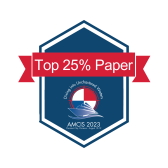Loading...
Paper Type
Complete
Description
This paper explores the Information Systems project implementations in organizations. It focuses on the actualization of the affordances that result from the intertwining of the Information Technology (IT) artefact and the organization and we answer to the following research question “How do organizations actualize affordances?” With a qualitative multiple case study on the different local entities of an international leading retailer, this research identifies that previous research omitted the top management sponsorship as one of the main influences for the actualization process. Moreover, constrains perception is observed in the collected data and its role is assessed. This paper contributes the development of the affordance theory by providing an updated process-based integrative theoretical framework for affordances at the organizational level, aimed to support further research on Information Systems.
Paper Number
1606
Recommended Citation
Perez Pedrola, Ferran and Vitari, Claudio, "Affordance Theory for Information Systems project implementation: a process and organizational outlook." (2023). AMCIS 2023 Proceedings. 5.
https://aisel.aisnet.org/amcis2023/sig_osra/sig_osra/5
Affordance Theory for Information Systems project implementation: a process and organizational outlook.
This paper explores the Information Systems project implementations in organizations. It focuses on the actualization of the affordances that result from the intertwining of the Information Technology (IT) artefact and the organization and we answer to the following research question “How do organizations actualize affordances?” With a qualitative multiple case study on the different local entities of an international leading retailer, this research identifies that previous research omitted the top management sponsorship as one of the main influences for the actualization process. Moreover, constrains perception is observed in the collected data and its role is assessed. This paper contributes the development of the affordance theory by providing an updated process-based integrative theoretical framework for affordances at the organizational level, aimed to support further research on Information Systems.
When commenting on articles, please be friendly, welcoming, respectful and abide by the AIS eLibrary Discussion Thread Code of Conduct posted here.




Comments
SIG OSRA